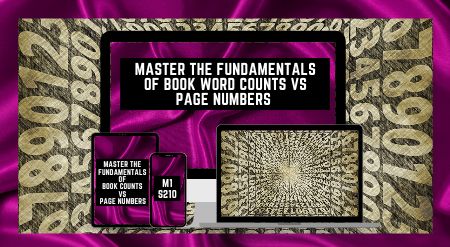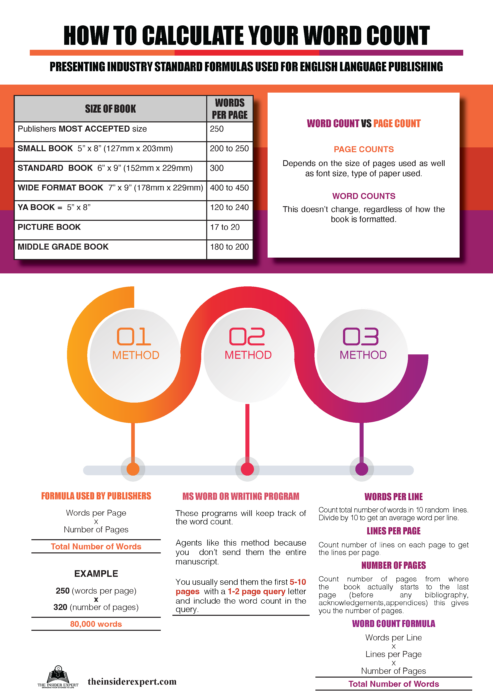SAMPLING FROM: Master the Fundamentals of Book Word Count and Page Numbers

This is a sampling of the content in Master the Fundamentals of Book Word Count and Page Numbers (M1-S210)
TOPIC: How to CALCULATE your Book’s Word Count
If you want to be a successful writer, it’s important to understand the difference between page count and word count. You’ll find out that publishers don’t look at word counts and page counts in the same way. Once you get the hang of using word counts, you’ll find it way easier to create and publish your books. Also, creating a schedule for your writing can really help you stay organised. For fiction writers, word count protects story flow and genre fit; for non-fiction writers, it safeguards clarity, authority, and value for the reader. In this lesson, you’ll find out about some go-to formulas that can help you figure out how many words are in your book.
Why Word Count Matters for: Fiction Writers
For a fiction writer, word count is more than a technical detail — it is a measure of how your story breathes. Every genre has an unspoken contract with its readers: crime thrillers promise sharp pacing and resolution within 70–90,000 words, romances tend to deliver their emotional arc in 60–80,000, while sprawling fantasies may run longer to build whole worlds. When you know these ranges, you can write with confidence, secure in the knowledge that your book will feel right to your intended audience.
Ignoring word count can work against you. If your novel runs far over, it may show you are indulging in tangents, drowning your reader in unnecessary detail, or risking a sluggish middle. If it falls short, it might suggest you have rushed your characters’ journeys, leaving emotional or narrative gaps that frustrate readers. Knowing the numbers allows you to balance description, dialogue, and plot in a way that keeps tension alive and momentum flowing.
Most importantly, word count discipline doesn’t suffocate creativity — it sharpens it. By working within boundaries, you are challenged to write leaner, tighter, and more purposeful prose. You learn to cut what does not serve the story and expand only where the reader truly needs depth. Agents, publishers, and even self-publishing platforms look for writers who understand this professional craft element. Respecting word count makes your work easier to sell, easier to market, and far more satisfying to read.
Why Word Count Matters for: Non-Fiction Writers
For non-fiction writers, word count is an act of respect — for the subject, the reader, and the publisher. When you write a biography, memoir, guide, or research-based book, your goal is not only to inform but also to sustain attention and build trust. A manuscript that drags on with repetition or digression signals that you value your words more than your reader’s time. One that is too short may suggest shallow research or a lack of conviction in your subject.
Word count sets a discipline: it forces you to decide what really matters in your book. Do you want to add yet another case study, or refine the one you have until it shines? Do you want to drown readers in endless statistics, or present data clearly and persuasively within a controlled space? Working to length ensures your arguments are presented with precision, your structure remains coherent, and your examples carry maximum weight.
Publishers and readers alike expect non-fiction to deliver on its promise — concisely, effectively, and with authority. A business book of 120,000 words may be viewed as bloated; a self-help guide of 20,000 words may appear insubstantial. Knowing the right length for your type of book helps you position it for impact in the marketplace. It also reassures readers: they know they are investing time and money in something substantial yet digestible.
In short, for the non-fiction writer, word count awareness is part of professional credibility. It is not about limitation, but about crafting a book that teaches, persuades, or inspires with clarity and power. When you master word count, you master focus — and focus is what makes your work unforgettable.
Questions to Ask Yourself that May Help

Questions for Fiction Writers
-
What is the typical word count range for my genre?
-
Am I writing within those expectations, or far outside them?
-
If I exceed the range, does it truly serve the story?
-
If I fall short, does my story feel underdeveloped?
-
Would agents or publishers reject my manuscript purely on length?
- Does the word count allow for a strong beginning, middle, and end?
- Is my inciting incident happening too late because of excess words?
- Does my middle section sag with unnecessary filler?
- Does the climax have enough space to build properly?
- Does the resolution feel rushed or drawn out?
-
Have I included too many subplots that inflate word count?
-
Are some subplots distracting from the main story?
-
Do all characters serve a purpose, or are some bloating the manuscript?
-
Are my characters’ arcs fully developed, or cut short by low word count?
-
Do I allow enough space for readers to connect emotionally with characters?
- Are descriptions too long and slowing momentum?
- Is dialogue stretched with unnecessary chatter?
- Does every chapter advance plot or character, or just pad the length?
- Does the pacing match my genre—fast for thrillers, slower for epics?
- Is each scene the right length, or could some be condensed?
-
Could my word count be trimmed by tighter editing?
-
Are there repeated ideas I can remove?
-
Do I overuse adjectives or adverbs that add bulk without value?
-
Are there passages of exposition that could be shown rather than told?
-
Could merging chapters improve flow and cut excess words?
- If I am under word count, where could I deepen the story?
- Are characters’ motivations fully explored?
- Does the setting feel immersive, or too thinly drawn?
- Have I skipped over emotional beats that need more space?
- Could the themes be explored in greater depth without padding?
-
Will readers find the book too long to be engaging?
-
Will they feel unsatisfied if the story is too short?
-
Does the length reflect the complexity of the story?
-
Is the reading experience consistent from start to finish?
-
Does the length build trust with readers that I understand the genre?
- Is the word count manageable for a debut novel?
- Does my target publisher have guidelines on word count?
- Could a high word count increase printing costs and limit sales?
- Would trimming increase my chances of getting published?
- If self-publishing, how does length affect pricing and perception?
-
Am I padding because I’m reluctant to cut?
-
Am I rushing to finish, leaving the story undercooked?
-
Does my word count reflect discipline or indulgence?
-
Is my book the length I would enjoy reading myself?
-
Am I afraid of cutting words because I think longer looks more “serious”?
-
Am I afraid of expanding because I think shorter looks “tidier”?
-
Have I compared my word count to successful books in my genre?
-
Would beta readers say it feels too long or too short?
-
Have I considered serialising if the story is too big for one book?
-
Does my word count serve the story, or is the story serving the number?
Questions for Non-Fiction Writers
- What word count range is typical for my type of non-fiction (memoir, business, history, self-help)?
- Does my manuscript meet those expectations?
- Am I overexplaining, or underexplaining, my subject?
- Does my chosen length reflect the depth required?
- Would the reader trust my authority if the book were too short?
-
Does my introduction set up the book efficiently?
-
Have I repeated the same points across chapters?
-
Does each chapter stay within a focused word range?
-
Am I balancing explanation with example?
-
Does my conclusion feel rushed because of word limits?
- Am I including more data than is necessary?
- Are case studies over-detailed and inflating length?
- Do I cite enough evidence to be credible without overwhelming the reader?
- Are there digressions that do not support the central argument?
- Could I condense footnotes, appendices, or sidebars into leaner forms?
-
Who is my target reader, and how much detail do they expect?
-
Will my reader feel overwhelmed if the book is too long?
-
Will they feel short-changed if it is too short?
-
Does my word count respect the time investment of readers?
-
Am I writing for general readers or specialists?
- Could sections be summarised more succinctly?
- Am I repeating definitions or explanations?
- Do I drift into tangents not central to the theme?
- Could graphics or tables replace lengthy text?
- Are there anecdotes that could be streamlined?
-
If under word count, where could I add more authority?
-
Do I fully explain the context behind my subject?
-
Could more examples improve understanding?
-
Have I explored counterarguments or just one perspective?
-
Have I left gaps that weaken my credibility?
- Does my publisher set specific word count limits?
- How does word count affect production costs and pricing?
- Would a shorter book sell better in today’s market?
- Would a longer book increase its status or weight?
- Does the word count fit with books already successful in my category?
-
Does my length encourage readers to finish the book?
-
Does it feel concise enough to be practical and usable?
-
Is it long enough to provide lasting value?
-
Does the flow feel balanced, or weighed down?
-
Does my word count reflect clarity, or clutter?
- Am I writing more than necessary to “prove” my knowledge?
- Am I cutting too much for fear of boring readers?
- Does my book length match the promise of my title and subtitle?
- Would I, as a reader, commit to reading a book of this length?
- Have I compared my length with respected titles in my field?
- Do I need to split this into two books rather than one oversized volume?
- Am I afraid my shorter book will be undervalued?
- Am I afraid my longer book will be ignored?
- Does my length strengthen my message or dilute it?
- Does my final word count reflect discipline, respect for readers, and professional quality?
PDF Workbook Instructions

Download your PDF handout and save it to your a folder you have created on your computer specifically for saving your ideas, so you can refer to it again and again.
Open the downloaded PDF handout in a PDF viewer
Save your files in your handout’s ideas computer folder so you can refer to them again and again.
Want More
Are you curious to learn more after trying the samples? Are you interested in picking up something new and figuring out the emotion or action you want your readers to feel after they finish your book?

Master the Fundamentals of Book Word Counts and Page Numbers (M1-S210)
If you’re after a more focused learning experience, this option could be just what you need. Many new writers focus on pages instead of words, but the publishing industry really cares about word counts. This course will guide you on what literary agents or publishers see as a no-no when it comes to sharing your word counts. You’ll get 7 lessons to learn at your own pace, and you can go over the material as many times as you want to really grasp the concepts.
This course gives you some great handbooks that explain how different story types affect your word counts, plus lists of word counts for best-selling fiction and non-fiction books to check out and compare.
